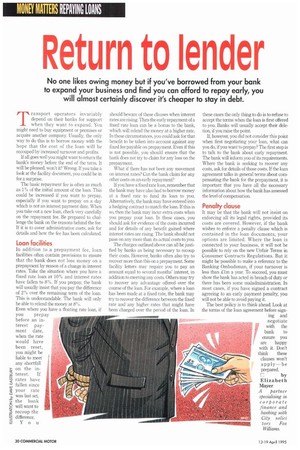Return to lender
Page 32

If you've noticed an error in this article please click here to report it so we can fix it.
No one likes owing money but if you've borrowed from your bank to expand your business and find you can afford to repay early, you will almost certainly discover it's cheaper to stay in debt.
Transport operators invariably depend on their banks for support when they want to expand. You might need to buy equipment or premises or acquire another company'. Usually, the only way to do this is to borrow money with the hope that the cost of the loan will be recouped by increased turnover and profits.
If all goes well you might want to return the bank's money before the end of the term. It will be pleased, won't it? Wrong. If you take a look at the facility document, you could be in for a surprise.
The basic repayment fee is often as much as 1% of the initial amount of the loan. This could be increased if you want to prepay, especially if you want to prepay on a day which is not an interest payment date. When you take out a new loan, check very carefully on the repayment fee. Be prepared to challenge the bank on the reasons behind the fee. If it is to COVET administrative costs, ask for details and how the fee has been calculated.
Loan facilities
In addition to a prepayment fee, loan facilities often contain provisions to ensure that the bank does not lose money on a prepayment by reason of a change in interest rates. Take the situation where you have a fixed rate loan at 10% and interest rates have fallen to 8%. If you prepay, the bank will usually insist that you pay the difference of 2% over the remaining term of the loan. This is understandable. The bank will only be able to relend the money at 8%.
Even where you have a floating rate loan, if you prepay before an interest payment date, when the rate would have been reset, you might be liable to meet any shortfall on the in terest. If rates have fallen since your rate was last set, the bank will want to recoup the difference.
You should beware of these clauses when interest rates are rising. Then the early repayment of a fixed rate loan can be a bonus to the bank, which will relend the money at a higher rate. In these circumstances, you could ask for that benefit to be taken into account against any fixed fee payable on prepayment. Even if this is not possible, you should ensure that the bank does not try to claim for any loss on the prepayment.
What if there has not been any movement on interest rates? Can the bank claim for any other costs on an early repayment?
If you have a fixed rate loan, remember that the bank may have also had to borrow money at a fixed rate to fund its loan to you. Alternatively, the bank may have entered into a hedging contract to match the loan. If this is so, then the bank may incur extra costs when you prepay your loan. In these cases, you should ask for evidence of the costs incurred and for details of any benefit gained where interest rates are rising. The bank should not pass on any more than its actual costs to you.
The charges outlined above can all be justified by banks as being necessary to recoup their costs. However, banks often also try to recover more than this on a prepayment. Some facility letters may require you to pay an amount equal to several months' interest, in addition to meeting any costs Others may try to recover any advantage offered over the course of the loan. For example, where a loan has been made at a fixed rate, the bank may try to recover the difference between the fixed rate and any higher rates that might have been charged over the period of the loan. In these cases the only thing to do is to refuse to accept the terms when the loan is first offered to you. Banks will usually accept their deletion, if you raise the point.
If, however, you did not consider this point when first negotiating your loan, what can you do, if you want to prepay? The first step is to talk to the bank about early repayment. The bank will inform you of its requirements. Where the bank is seeking to recover any costs, ask for details of those costs. If the loan agreement talks in general terms about compensating the bank for the prepayment, it is important that you have all the necessary information about how the bank has assessed the level of compensation.
Penalty clause
It may be that the bank will not insist on enforcing all its legal rights, provided its costs are covered. However, if the bank wishes to enforce a penalty clause which is contained in the loan documents, your options are limited. Where the loan is connected to your business, it will not be possible to rely on the new Unfair Terms in Consumer Contracts Regulations. But it might be possible to make a reference to the Banking Ombudsman, if your turnover is less than £1m a year. To succeed, you must show the bank has acted in breach of duty or there has been some maladministration. In most cases, if you have signed a contract agreeing to an early payment penalty, you will not be able to avoid paying it.
The best policy is to think ahead. Look at the terms of the loan agreement before signing and negotiate
iwith the bank to ensure you are happy with it. Don't think these clauses won't apply—be prepared.
FT by Elizabeth Mayer
A partner specialising in corporate finance and banking with City solici tors Fox Williams.
































































































